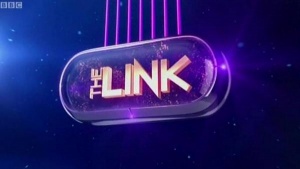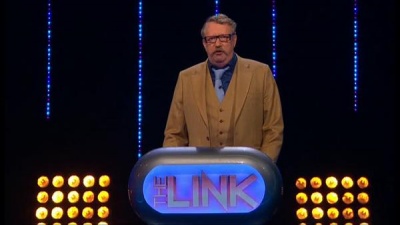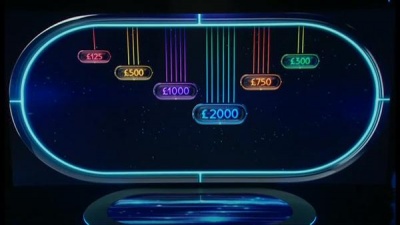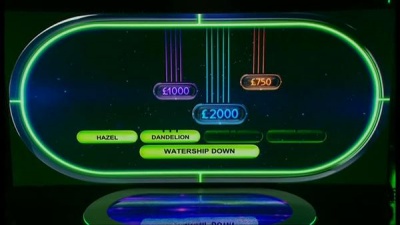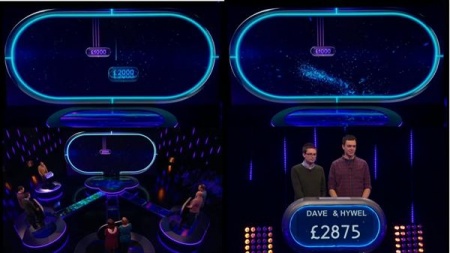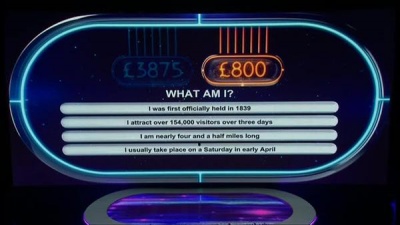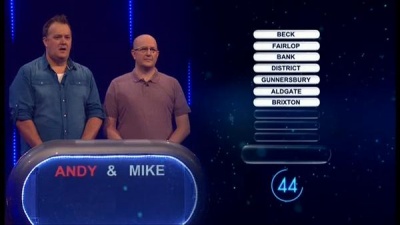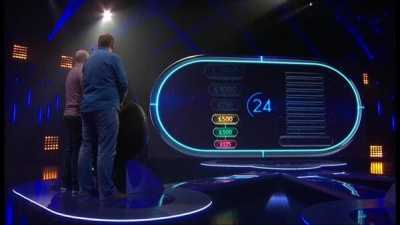The Link
(→Inventor: add) |
|||
| Line 48: | Line 48: | ||
Based on the board game Linkee, which had previously been pitched on [[Dragons' Den]] but failed to attract investment. | Based on the board game Linkee, which had previously been pitched on [[Dragons' Den]] but failed to attract investment. | ||
| + | |||
| + | Unusually for a BBC 2:15 game show, Challenge bought and showed the first series in 2016. It lasted three weeks in the 7pm slot before being shunted back to 4pm for its final two weeks. | ||
== Theme music == | == Theme music == | ||
Revision as of 21:23, 30 September 2017
Contents |
Host
Mark Williams
Broadcast
STV Productions in association with Linkee TV and BBC Scotland for BBC One, 5 May 2014 to 17 July 2015 (65 episodes in 2 series)
Synopsis
Mark Williams (best known as a Harry Potter actor) hosts a near-impossible quiz show about connections.
Three pairs take part in this game. They're shown a board with six amounts of money - £125, £300, £500, £750, £1000, and £2000. Each amount is suspended by "links" - one for the £125, progressing up to six for the £2000 pod.
Mark asks a general knowledge question, and players buzz as individuals to answer that question. A right answer goes up on the board, and the pair who gave that right answer get a chance to spot the link. Getting the connection between the answers allows them to cut some of the links holding up the prizes.
With a total of 21 links to sever, and a maximum of four links to cut at a time, this opening round goes on a bit. It will often take up more than half of the show's runtime, and it feels slower and more awkward than it needs to. Mark Williams likes to give the impression that this round is deeply tactical, but that's nonsense. If you've won enough links to take a pod, you take it. If there are any left over, just cut links anywhere. It doesn't matter where. (Actually, and concentrate really hard for this one, there is one vanishingly rare scenario where you might take a genuinely tactical decision, which is if you are presented with two pods having three links each, and one or more with at least four, and win two cuts. In that situation, you might tactically choose to use one or both of your two cuts on the pod(s) with 4+ links, so as to ensure that even if your opponents win four cuts on the next question, they will only be able to claim one pod and not two.) To make matters even worse, one huge and annoying flaw is that there are always some questions from which it is impossible to score; when there are more links to any individual pod than points available for a question, it makes no difference whatsoever which team answers it. Such a question is nice for the viewers to have a go at, but it has no actual bearing on the game. In short, it's padding. In fact, though nobody involved ever seems to notice it, at those points the game technically flips from competitive to collaborative. This wouldn't be a problem in itself, except that the aim of the collaboration is not to win or bank money, but simply to get the padding out of the way. That's flawed game design.
Eventually, the round is over, and the top two pairs progress. They're in a best-of-seven race to release the money they won in the first round. In this second round, the players specify the number of clues they wish to see, and cut the appropriate number of links with a right answer. A wrong answer goes over to the other side for a bonus point.
The winners of this second round go through to the daily final. The money they won in round one, and retained in round two, is added to £2000 for the jackpot - typically somewhere over £3000. One of the players will see a list of one-word clues, each leading to a "super link". Get a correct answer, and progress up the money tree - it's £125, £300, £500, £750, £1000, and the jackpot. But there's a clock under this game, and if this hits zero, the team leaves with nothing.
Clues appear at intervals of slightly more than a second. The only way to win the jackpot is to buzz early and get lucky.
Inventor
Tristan Hyatt-Williams, Ben Drummond and Dean Tempest
Based on the board game Linkee, which had previously been pitched on Dragons' Den but failed to attract investment.
Unusually for a BBC 2:15 game show, Challenge bought and showed the first series in 2016. It lasted three weeks in the 7pm slot before being shunted back to 4pm for its final two weeks.
Theme music
Toby Jarvis

